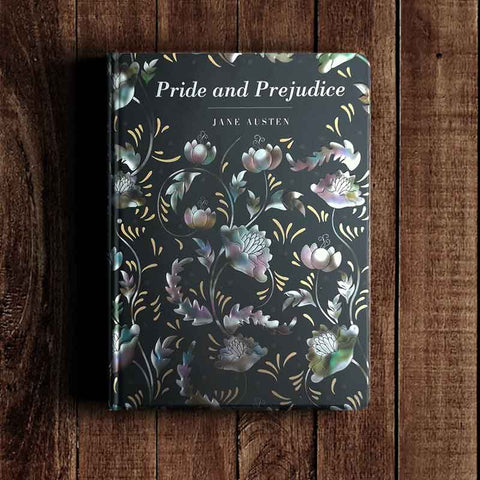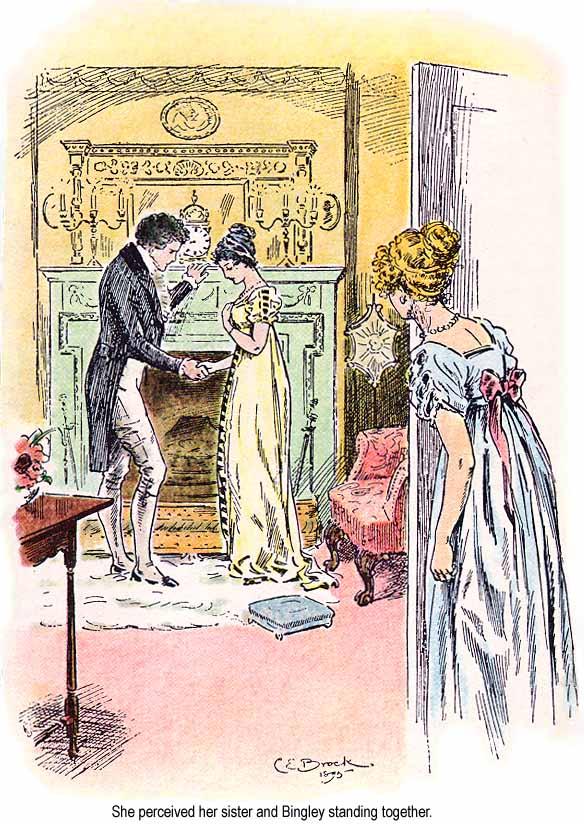The Complex Mind of Pride and Prejudice's Elizabeth Bennet
We have learned, and continue to learn, that a person seems to have both conscious and subconscious thoughts. In this article, Seth Snow considers the complex mind of Pride and Prejudice's Elizabeth Bennet.

Conscious thoughts are those thoughts that influence our behaviour with our knowing it, whereas subconscious thoughts are those thoughts that influence our behaviour without our knowing it. I will propose that the characters in Jane Austen’s Pride and Prejudice have both conscious and subconscious thoughts, by examining Elizabeth’s conversation with Charlotte Lucas, which occurs early in the novel. While there are other passages in Pride and Prejudice dealing with conscious and subconscious thoughts of characters, I will narrow this discussion to one passage.
Charlotte Lucas, in an early conversation with Elizabeth Bennet about Jane Bennet’s plan to marry Mr. Bingley, suggests that Jane should be more honest and straightforward with her feelings towards Bingley to ensure that she can “secure” him to marry her. Elizabeth then says to Charlotte,
“Your plan is a good one…where nothing is in question but the desire of being well married; and if I were determined to get a rich husband, or any husband, I dare say I should adopt it. But these are not Jane’s feelings; she is not acting by design”.
Elizabeth, through the word “determined,” is, in her conscious mind, trying to express at least three ideas to Charlotte: Jane’s feelings, her own feelings, and her view of marriage relative to Charlotte’s view of marriage.
Regarding Jane’s feelings in Pride and Prejudice, Elizabeth seems to think that Jane is genuine concerning how much affection she shows, and will continue to show, towards Bingley. She makes this point by contrasting Jane’s situation to her own, which is not one in which she is “determined” to marry by “design.” “Determined,” here, seems then to mean moving somewhere in a fixed direction or not deviating from a particular path. By pointing out that she is not “determined” to marry, Elizabeth is also trying to promote a way of thinking that separates herself from women such as Charlotte Lucas who are “determined” to marry primarily for “security” rather than primarily for love, which is what Elizabeth desires in marriage. While Elizabeth obviously wants to marry a wealthy man, which she eventually does in Darcy, love and respect are of the highest priority to her, making marrying merely for security, without love and respect, problematic.
Not marrying for love, according to Elizabeth, is seen in Charlotte’s wanting Jane to “secure” Bingley, regardless of whether she loves him or not. Then, Charlotte suggests, should the cards be favorable, Jane would possibly fall in love later in life with Bingley, thus finding happiness as an add-on, or a “matter of chance”, to securing material comfort. Charlotte, in her eventual marriage to Collins, remains consistent in her “determined” thinking by marrying a man whom she does not respect but who, nevertheless, still offers her a “secure” position by providing materially for her. Elizabeth, on the other hand, tries to take the moral high road, so to speak, by consciously promoting her own principles, not marrying by “design,” to make clear to Charlotte that she differs from her regarding how a woman ought to think about courtship and marriage. Elizabeth may also feel as though a “determined” woman will use whatever means necessary to “secure” a husband.
Characters such as Mrs. Bennet, whose mindset is for all her daughters to get married, go to extremes to secure a potential husband for them. A few pages after this scene, for instance, Mrs. Bennet devises a plan to send Jane to Netherfield on horseback, all in effort for her to catch the cold and stay with the Bingleys. In the context of the “determined” passage, Charlotte also tells Elizabeth that she wants to “fix” a husband, which is another way of saying “secure” a husband. With these examples in mind, Elizabeth may consciously want to separate herself from this kind of thinking since women often had the reputation of trying to trap men into marriage. Since Elizabeth wants to marry for love and affection, not just for security, her conscious mind would certainly want to dismiss the possibility of “fixing” a man for herself and being labeled as a trapper of men.
While more can obviously be said above about Elizabeth’s conscious feelings, she also has subconscious thoughts and feelings about the word “determined.” In Pride and Prejudice, a reader must remember that Elizabeth is a young woman who would like to get married one day and has just been shunned by a handsome and eligible Mr. Darcy at the ball. While Elizabeth is not consciously thinking about Mr. Darcy when she says, “determined,” one can reasonably guess that his offensive comments are present in her subconscious thoughts, making her not want to feel consciously as “determined” to marry due to injured pride, hurt feelings, insecurity, or whatever.
Moreover, a reader should notice that Elizabeth consciously inserts herself into a conversation about her sister Jane; that is, the conversation begins with the focus on Jane, briefly shifts to Elizabeth and her lack of “determination,” and then returns back to Jane. Because Elizabeth inserts herself into a conversation about her sister’s courtship and marriage and tries to present a strong case that she herself is not “determined” to marry, one may speculate that she subconsciously may also be afraid or worried that she will never fall in love and marry. Elizabeth clearly wants to marry for love, not just for security, but Charlotte’s practical approach to marriage and her own sister’s early success with Bingley at the ball likely play a part in her reflecting on her own anxieties and fears about being a young woman experiencing the trials and tribulations of trying to find the right man to marry (and all while not finding herself becoming any younger, which was an issue for women in this novel).
While Elizabeth’s conscious mind wants to promote a kind of thinking that is not “determined” to marry “any” man, a thought process that clearly differs from Charlotte’s practical thinking, her subconscious mind is likely more “determined” to marry than she consciously is able to acknowledge. However, as a young woman, wanting to wait for love requires a strong heart and mind, and that may be what Elizabeth is trying to achieve in this passage by consciously using the word “determined” all while subconsciously expressing feelings of concern and worry about her future marriage prospects. Furthermore, Elizabeth may also be subconsciously expressing her frustration towards Charlotte, whose practical, un-romantic view of marriage may violate what Elizabeth deems to be a ‘dream-team’ friendship; that is, both women, Elizabeth would think, would want to marry for love and affection, not simply material advantage and security.
Because Elizabeth’s close friend has let down the dream team, she may be upset with Charlotte subconsciously, thus using “determined” at a conscious level to make herself feel better about Charlotte’s letting her down. In other words, if Elizabeth truly believes in her way of thinking about courtship and marriage, then Charlotte’s departure from Elizabeth’s thinking, while hurting Elizabeth subconsciously, would need to be expressed through the word “determined,” which is Elizabeth’s way to convince both herself and Charlotte that her “determination” not to marry is correct and that marrying solely for security is flawed, as she sees it. Along with her subconscious frustration towards Charlotte, Elizabeth may also be frustrated with her mother, whose own “determination” is putting pressure on Elizabeth to settle on men such as Collins, who can offer “security” but not affection and respect.
Honouring one’s parents is important, and Elizabeth would certainly want to proceed with caution in that area. Additionally, Elizabeth’s financial situation is much like Charlotte’s. Elizabeth may subconsciously, then, fear that her conscious lack of “determination” will prevent her from getting married. She knows that she cannot live on her own should something happen to her parents and may see herself in Charlotte—whose practicality, while lacking the dreaminess of Elizabeth’s standards for marriage—will secure her a comfortable life. Moreover, Jane seems to have found both affection and financial security in Bingley, so Elizabeth may subconsciously feel jealous towards Jane’s seeming good fortune with Bingley, while Elizabeth, as mentioned above, had just recently been snubbed by an eligible, handsome Mr. Darcy at the same dance where Jane experienced success.
These reasons certainly could influence Elizabeth’s conscious mind to say that she is not “determined” to marry. Pride and Prejudice, while presenting a straightforward storyline, becomes quite complex when the reader considers a character’s conscious and subconscious thoughts, and what their words reveal about the character’s heart and mind.
Seth Snow has a master's degree in English Literature from The University of Akron and teaches a course called Jane Austen, where he and his students read and discuss Emma and Persuasion. He also teaches Pride and Prejudice and Sense and Sensibility in British Literature and Women's Literature, respectively.
Sign up to the Jane Austen newsletter for exclusive updates and discounts from our Online Gift Shop.


